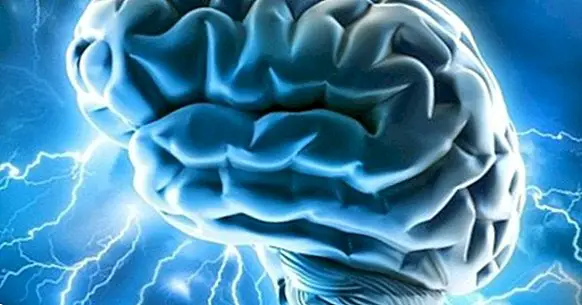8 psychological curiosities that will impact you
There are many interesting facts about the way our brain and our psyche work that most people do not yet know, and they would probably be surprised. The mechanisms that regulate our cognition are complex and give rise to many differences between individuals.
Psychological curiosities
We invite you to take a look at the two previous installments on psychological curiosities , in the previous articles:
"10 psychological phenomena that will surprise you"
"8 psychological myths that already have a scientific explanation"
On this occasion we offer you a total of eight new curiosities in this article. I bet many of them will surprise you.
1. Whenever we sleep, we dream
It is true that we are not always able to remember the dreams we have had, but several scientific investigations have revealed that the brain activity during sleep generates that we dream when reaching the REM phase during the break.
Studies show that we do not remember 90% of the content of our dreams and that, even if we were to remember them, half of this content we would forget after five minutes of waking up, since the brain captures new stimuli and tends to detach itself from that information. If you want to remember more and better your dreams, it is quite useful to write down as much as possible all your dreams in a notebook that you have on the bedside table, every day when you wake up.
If you want to know more about the world of dreams: "10 curiosities about dreams, revealed by science"
2. How much does the brain weigh?
The brain of men is slightly heavier than that of women. The average figure among males is 1,400 grams, while the female brain weighs 1,250 grams .
This does not mean that the man has a greater intelligence than the woman, as we could see in the article "Are women or men more intelligent?". Although it is true that, some time ago, the first scientists who measured the weight of the brains came, wrongly, to the conclusion that man should possess greater intellectual gifts. The difference in size is due to a principle of proportionality , and while the man is usually taller and heavier than the woman, the size of the brain adjusts to these body proportions, so that the greater the body, the greater the brain.
3. We are programmed to flee before a danger
When we face extreme situations, of anguish, fear or danger, our body activates some Innate mechanisms that allow us to flee to get away from danger . In other words, we are designed to guarantee our survival, and thus that of the human species.
In these extreme situations in which we are in imminent danger, the adrenal glands are drastically activated and generate adrenalin , a hormone that increases the heart rate and contracts the blood vessels , preparing the body to make a high intensity physical effort. It is for this reason that we are able to undertake almost superhuman actions when we are in a state of panic, as for example it has been the case of mothers who have managed to lift cars or very heavy objects to rescue a trapped child.

4. We grow while we sleep
When we sleep our brain secretes most of the hormone responsible for the growth of muscles and the bones. For this reason it is absolutely essential that children rest and sleep the necessary hours.
5. The "ghost member"
Many similar cases have been reported: a person has a limb amputated, and subsequently begins to have the feeling that that limb is still in place . In fact, many cases reveal having suffered pain in the amputated limbs. This phenomenon is known as the "phantom limb syndrome " We detail it in the article "The ghost member: therapy of the mirror box".
The reason why this happens has its origin in the brain. Apparently, the brain area responsible for regulating the mobility and touch of the limb is still active, and in the absence of real nervous stimuli, tends to create them.
6. There are people unable to recognize faces
These cases of people who can not recognize faces are caused by a disorder called prosopagnosia (from Greek prosopon, which means "face" and agnosia, which refers to "lack of knowledge"), and this makes it impossible to recognize faces.
This impediment causes can not recognize familiar faces, so they are unable to recognize their loved ones Through their image and must resort to observe some specific characteristics, such as the way of walking, tone of voice, or some other distinctive feature except the face to be aware of who they have in front. In more severe cases, those affected may not be able to recognize themselves in front of a mirror or in a photograph.
7. An antidepressant that causes uncontrollable orgasms
The essential chemical component of certain drugs against depression is the clomipramine . This type of medication is not only used to remedy depression, but it is also used in anxiety, phobias and other types of disorders.
Some of the people who are treated with this type of drugs usually report that, at the beginning of treatment, they experience uncontrollable orgasms at the time of yawning . It was calculated that up to 5% of patients noticed this strange effect, both men and women.
Although we might think of this as a positive side effect of the drug, the truth is that the people who suffered it had problems and discomforts in their daily lives.
8. Amnesia does allow you to remember
Although it is true that the idea that amnesia eliminates the past memories of the person who suffered it after the trauma is always transmitted, in reality this type of amnesia, called "retrograde", is very unusual.
The most common type of amnesia is called antegrade amnesia. Is about an amnesia in which the person is able to remember practically everything that happened with normality , but on the other hand he can not remember anything of what he is going through, he is not able to remember what happened yesterday, or he is even unable to remember what he did ten minutes ago. This form of amnesia is the most common among people suffering from dementia.



















